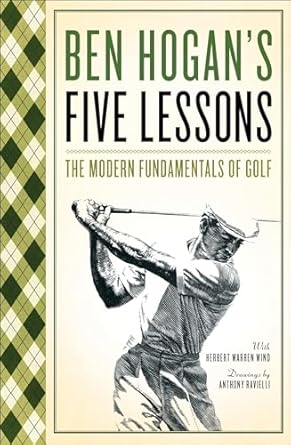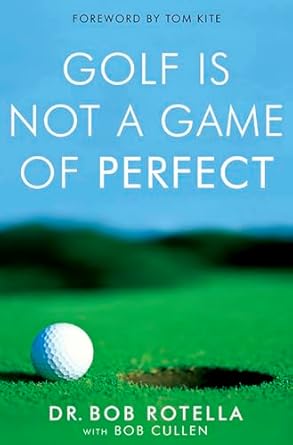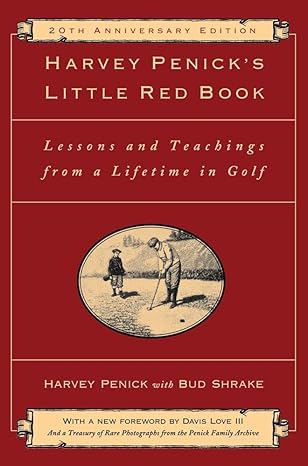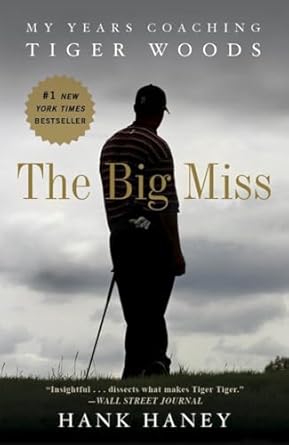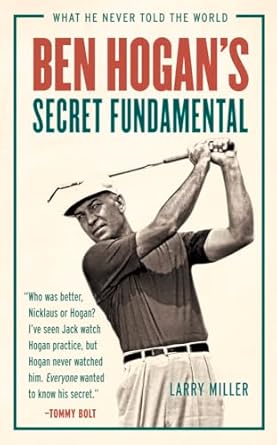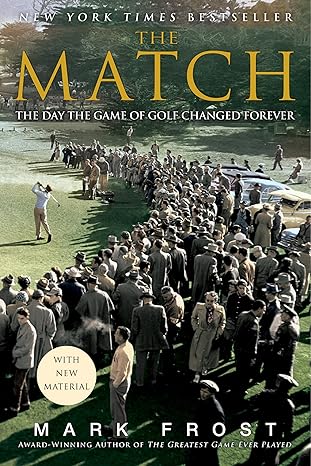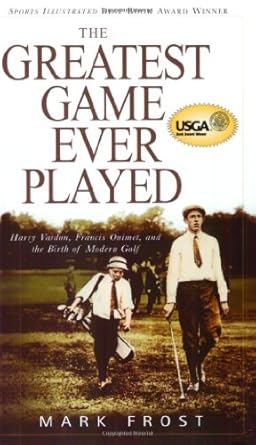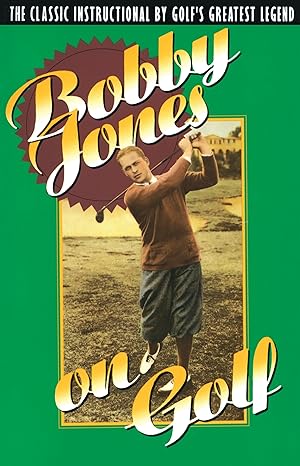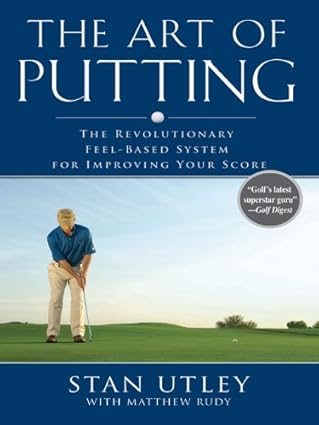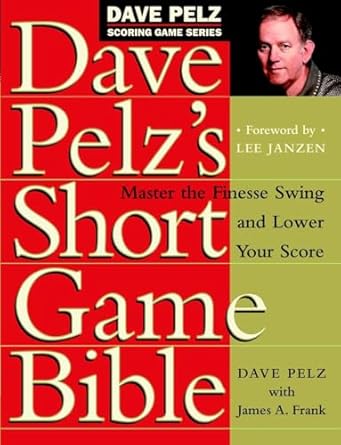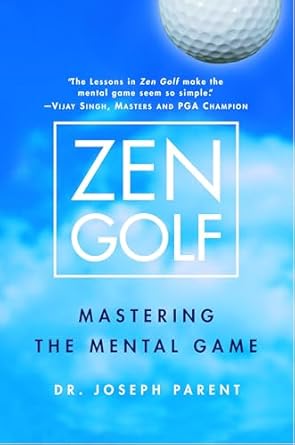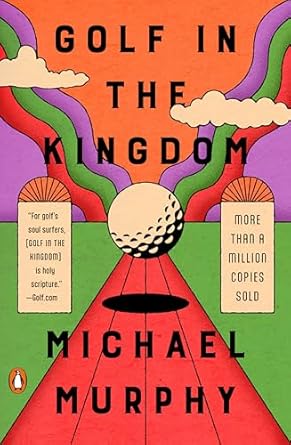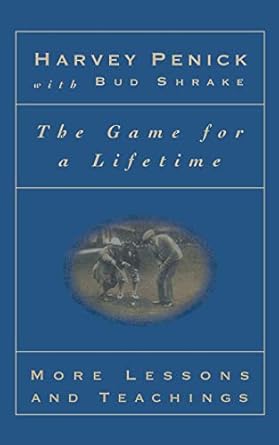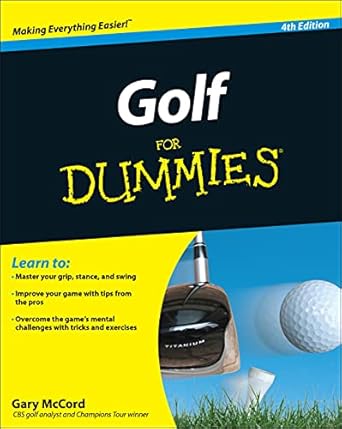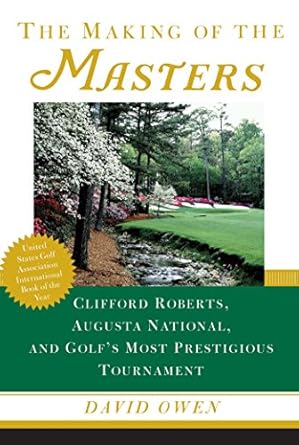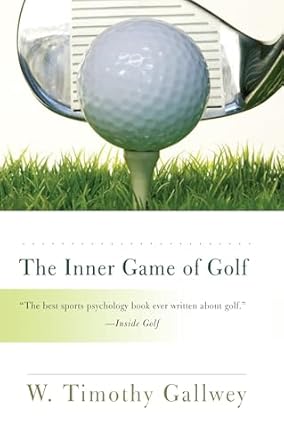Summary: In today's article, I have picked 20 of the best golf books to help improve your game, enhance your mental approach, and deepen your appreciation for the sport. Here are my top 3:
- Ben Hogan's Five Lessons: The Modern Fundamentals of Golf by Ben Hogan
- Golf is Not a Game of Perfect by Dr. Bob Rotella
- A Good Walk Spoiled by John Feinstein
Golf books are a great way to dive deeper into the game, whether you're looking to improve your swing, sharpen your mental game, or learn about the legends who’ve made golf what it is today. They offer valuable tips and insights for players of all skill levels and give you a better understanding of the sport’s history and strategy. Beyond improving your game, these books help you appreciate golf as a game of precision, passion, and focus.
TOP 20: Best Golf Books
- Ben Hogan's Five Lessons: The Modern Fundamentals of Golf by Ben Hogan
- Golf is Not a Game of Perfect by Dr. Bob Rotella
- A Good Walk Spoiled by John Feinstein
- The Little Red Book by Harvey Penick
- The Big Miss by Hank Haney
- Ben Hogan's Secret Fundamental by John Schlee
- The Secret of Golf by Joe Parent
- The Match: The Day the Game of Golf Changed Forever by Mark Frost
- The Greatest Game Ever Played by Mark Frost
- The Fundamentals of Golf by Bobby Jones
- The Art of Putting by Stan Utley
- The Short Game Bible by Dave Pelz
- Zen Golf: Mastering the Mental Game by Joseph Parent
- How I Play Golf by Tiger Woods
- Golf in the Kingdom by Michael Murphy
- Golf’s Greatest Secret by Harvey Penick
- Golf For Dummies by Gary McCord
- The Anatomy of Greatness by Brandel Chamblee
- The Making of the Masters: Clifford Roberts, Augusta National, and Golf's Most Prestigious Tournament by David Owen
- The Inner Game of Golf by W. Timothy Gallwey
1. Ben Hogan's Five Lessons: The Modern Fundamentals of Golf
- Author: Ben Hogan
- About: A classic that breaks down the fundamental aspects of the golf swing.
- Style of writing: Instructional, straightforward, and technical.
- Length: ~40,000 words
- Year written: 1957
- Emotional impact: Leaves a lasting impression on improving one's technique and understanding of the game.
- Difficulty level: Intermediate to advanced
- Why read it: It's a timeless guide from one of the game's legends, teaching the essentials of the golf swing.
2. Golf is Not a Game of Perfect
- Author: Dr. Bob Rotella
- About: Focuses on the mental side of golf and how to maintain a positive mindset.
- Style of writing: Motivational and psychological, with practical advice.
- Length: ~50,000 words
- Year written: 1995
- Emotional impact: Motivational and thought-provoking, helps golfers think more positively.
- Difficulty level: Easy to moderate
- Why read it: Essential for golfers who want to improve their mental game and handle pressure better.
3. A Good Walk Spoiled
- Author: John Feinstein
- About: A behind-the-scenes look at the PGA Tour during the 1990s, offering insight into the personalities of the players.
- Style of writing: Narrative, journalistic, and insightful.
- Length: ~90,000 words
- Year written: 1995
- Emotional impact: Engaging and eye-opening, revealing the highs and lows of professional golf.
- Difficulty level: Easy to moderate
- Why read it: For those interested in the personalities and drama behind professional golf.
4. The Little Red Book
- Author: Harvey Penick
- About: A collection of advice and tips from one of the most respected golf instructors.
- Style of writing: Personal, charming, and insightful.
- Length: ~50,000 words
- Year written: 1992
- Emotional impact: Warm and inspirational, often leaving readers with practical tips they can immediately use.
- Difficulty level: Easy
- Why read it: A simple, yet profound guide filled with timeless wisdom on golf's fundamentals.
5. The Big Miss
- Author: Hank Haney
- About: A memoir by Tiger Woods' former coach, offering a glimpse into Woods' career and personal life.
- Style of writing: Reflective, detailed, and somewhat revealing.
- Length: ~85,000 words
- Year written: 2012
- Emotional impact: Insightful and sometimes shocking, especially for fans of Tiger Woods.
- Difficulty level: Moderate
- Why read it: For readers curious about Tiger Woods and the inside story of his career.
6. Ben Hogan's Secret Fundamental
- Author: John Schlee
- About: A book that highlights Hogan's lesser-known swing secrets and strategies.
- Style of writing: Technical, instructional, and methodical.
- Length: ~45,000 words
- Year written: 1990
- Emotional impact: Inspires a deeper understanding of Hogan’s legendary swing mechanics.
- Difficulty level: Advanced
- Why read it: Perfect for golfers looking to emulate one of the greatest swing styles in golf.
7. The Secret of Golf
- Author: Joe Parent
- About: Focuses on the mental and emotional aspects of golf, blending psychology and strategy.
- Style of writing: Psychological, practical, and encouraging.
- Length: ~60,000 words
- Year written: 2000
- Emotional impact: Helps golfers stay calm and focused, improving their mental toughness.
- Difficulty level: Easy to moderate
- Why read it: Essential for golfers who want to improve their mental game and find a deeper connection to the sport.
8. The Match: The Day the Game of Golf Changed Forever
- Author: Mark Frost
- About: A narrative about the historic match between golf legends Ben Hogan, Byron Nelson, Sam Snead, and Arnold Palmer.
- Style of writing: Historical, narrative, and dramatic.
- Length: ~80,000 words
- Year written: 2007
- Emotional impact: Captivating and inspiring, highlighting golf’s rich history.
- Difficulty level: Moderate
- Why read it: Great for those who love golf history and want to learn about the game’s transformation.
9. The Greatest Game Ever Played
- Author: Mark Frost
- About: Chronicles the story of Francis Ouimet's victory in the 1913 U.S. Open.
- Style of writing: Narrative, inspiring, and historical.
- Length: ~95,000 words
- Year written: 2002
- Emotional impact: Uplifting, showcasing determination and the underdog story.
- Difficulty level: Moderate
- Why read it: A must-read for fans of golf history and those who enjoy underdog stories.
10. The Fundamentals of Golf
- Author: Bobby Jones
- About: Offers insights into the fundamentals of golf from one of the game's greatest players.
- Style of writing: Instructional, technical, and thoughtful.
- Length: ~40,000 words
- Year written: 1925
- Emotional impact: Provides a lasting understanding of golf fundamentals.
- Difficulty level: Intermediate
- Why read it: For those looking to learn the fundamentals of the game from a golfing legend.
11. The Art of Putting
- Author: Stan Utley
- About: Focuses on improving putting technique and developing a solid mental approach to the green.
- Style of writing: Instructional, clear, and focused on practical advice.
- Length: ~50,000 words
- Year written: 2000
- Emotional impact: Helpful and motivating, especially for golfers looking to improve their short game.
- Difficulty level: Moderate
- Why read it: Essential for golfers seeking to improve their putting and lower their scores.
12. The Short Game Bible
- Author: Dave Pelz
- About: A comprehensive guide to the short game, offering tips on chipping, pitching, and putting.
- Style of writing: Technical, educational, and detailed.
- Length: ~75,000 words
- Year written: 2000
- Emotional impact: Practical and results-driven, helping golfers lower their handicap by mastering the short game.
- Difficulty level: Moderate to advanced
- Why read it: Ideal for players looking to significantly improve their short game and lower scores.
13. Zen Golf: Mastering the Mental Game
- Author: Joseph Parent
- About: Combines golf with Zen philosophy to help players achieve a calm, focused, and clear mindset.
- Style of writing: Philosophical, reflective, and meditative.
- Length: ~45,000 words
- Year written: 2002
- Emotional impact: Calming and transformative, providing a unique approach to mastering the mental side of golf.
- Difficulty level: Easy to moderate
- Why read it: For golfers seeking to improve their mental game and find peace on the course.
14. How I Play Golf
- Author: Tiger Woods
- About: A guide to Tiger Woods' techniques, strategies, and thoughts on the game of golf.
- Style of writing: Personal, instructional, and detailed.
- Length: ~60,000 words
- Year written: 2001
- Emotional impact: Inspirational, showcasing Woods' approach to golf and his relentless drive for success.
- Difficulty level: Moderate
- Why read it: A great read for those who admire Tiger Woods and want to understand his approach to the game.
15. Golf in the Kingdom
- Author: Michael Murphy
- About: A philosophical novel that explores the mystical side of golf, blending the game with spiritual and existential themes.
- Style of writing: Reflective, philosophical, and somewhat mystical.
- Length: ~80,000 words
- Year written: 1972
- Emotional impact: Thought-provoking and introspective, offering a deeper, almost spiritual look at golf.
- Difficulty level: Moderate
- Why read it: For golfers who are interested in a more philosophical and spiritual perspective on the game.
16. Golf’s Greatest Secret
- Author: Harvey Penick
- About: Explores the fundamentals of the game and reveals Penick's personal secrets to success.
- Style of writing: Warm, personal, and insightful.
- Length: ~45,000 words
- Year written: 1992
- Emotional impact: Inspiring and timeless, with a focus on simplicity and enjoyment of the game.
- Difficulty level: Easy
- Why read it: A simple, yet profound guide by one of the game's most respected instructors.
17. Golf For Dummies
- Author: Gary McCord
- About: A beginner-friendly guide covering everything from the basics of golf to etiquette, technique, and strategy.
- Style of writing: Fun, accessible, and lighthearted.
- Length: ~80,000 words
- Year written: 2001
- Emotional impact: Light-hearted and motivational, making golf feel less intimidating for newcomers.
- Difficulty level: Beginner
- Why read it: Perfect for beginners or casual players who want to understand the basics of golf and have fun with it.
18. The Anatomy of Greatness
- Author: Brandel Chamblee
- About: Analyzes the swings of golf’s greatest players and breaks down their techniques.
- Style of writing: Analytical, detailed, and insightful.
- Length: ~75,000 words
- Year written: 2016
- Emotional impact: Fascinating for golf enthusiasts, offering a deeper understanding of the game’s legends.
- Difficulty level: Advanced
- Why read it: A must-read for golfers who want to understand what made the swings of great players like Hogan and Woods so effective.
19. The Making of the Masters: Clifford Roberts, Augusta National, and Golf's Most Prestigious Tournament
- Author: David Owen
- About: Chronicles the history of the Masters Tournament and its influence on the game of golf.
- Style of writing: Historical, informative, and detailed.
- Length: ~90,000 words
- Year written: 2002
- Emotional impact: Fascinating and informative, providing rich insight into the history of Augusta and the Masters.
- Difficulty level: Moderate
- Why read it: For golf fans interested in the origins and evolution of one of the most prestigious tournaments in the sport.
20. The Inner Game of Golf
- Author: W. Timothy Gallwey
- About: Focuses on the mental side of golf, emphasizing the relationship between the mind and performance.
- Style of writing: Psychological, introspective, and encouraging.
- Length: ~60,000 words
- Year written: 1974
- Emotional impact: Thought-provoking, helping golfers unlock their mental potential and perform better.
- Difficulty level: Easy to moderate
- Why read it: For anyone looking to improve their mental game and develop a calmer, more focused approach to golf.
Conclusion
To wrap things up, I think golf books are a great way to improve your game, whether you're focusing on your technique, mental toughness, or gaining a deeper understanding of the sport’s history. Out of the many excellent choices, Ben Hogan's Five Lessons: The Modern Fundamentals of Golf, Golf is Not a Game of Perfect, and A Good Walk Spoiled are, in my opinion, top picks. These books offer timeless advice, mental strategies, and captivating stories that can help golfers at any level sharpen their skills and develop a greater appreciation for the game.

